Extend the season
A bountiful year spills over into a bountiful fall! The first week of November we will conclude the full season CSA, and then we’ll proceed as in years past with 3 more every-other-week Friday deliveries: November 18, December 2 and 16. Shares will consist of the usual roots, squashes, cabbages and greens and cost $100. We will accommodate you with pick up times and places.
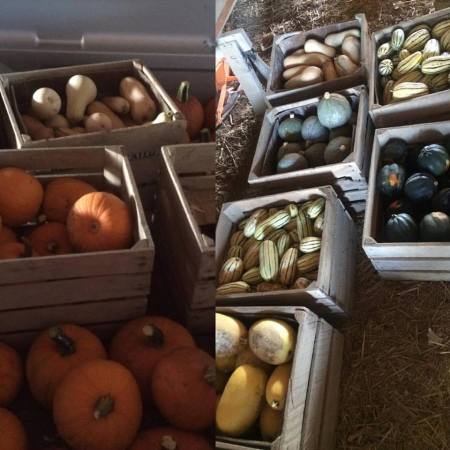
Last call for chickens
We are about a month away from the last chicken harvest of the year. Speak soon if you are interested, because it will be many months before the chance comes again.
Thanks-giving time
It is not November yet, but in the vegetables farmer’s life, the tale is largely told. The crops were planted. The weeds and armyworms and the like were weathered. The weather was weathered. The barn is full of cured and curing food. Twenty weeks of busting-full, beautiful boxes have been packed. Our thanks extend, as Campbell might say, “Fifty-eight ten infinities.”
On the mundane, nitty-gritty level, the farm is wholly indebted to those down in the trenches, doing the work, early, hot, and late, sharing the humor and humility. We are a well-oiled machine: we pick the produce, pack the boxes, eat a delicious lunch; the van arrives like clockwork,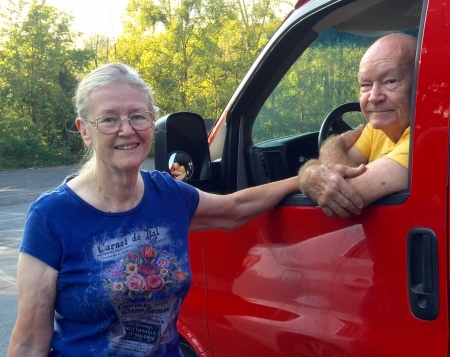 the pick-ups are properly handled, Phyllis’ newsletter knows exactly what to do with every thing. The list goes on, but the bottom line is simple: the working members of A Place on Earth CSA Farm are an amazing collection of diamonds in the rough. Thanks especially to John, Stan, and Jonna, who make me want to work harder and be better.
the pick-ups are properly handled, Phyllis’ newsletter knows exactly what to do with every thing. The list goes on, but the bottom line is simple: the working members of A Place on Earth CSA Farm are an amazing collection of diamonds in the rough. Thanks especially to John, Stan, and Jonna, who make me want to work harder and be better.
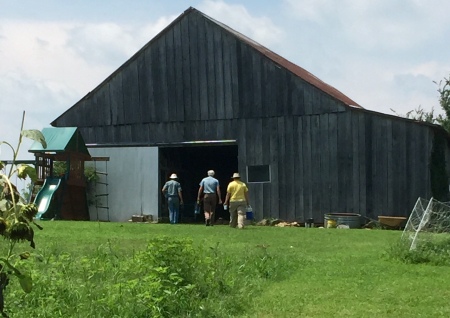
Heartfelt thanks to all of you for placing your faith in us and living differently. We know how much work you do in the kitchen. We know that other food options can be more customized and convenient. We know that you don’t have to participate in our CSA or any CSA. You have sustained us now for 12 years, spanning two farms and the arrival of two brand-new farmers. Thanks for making this grand journey possible.
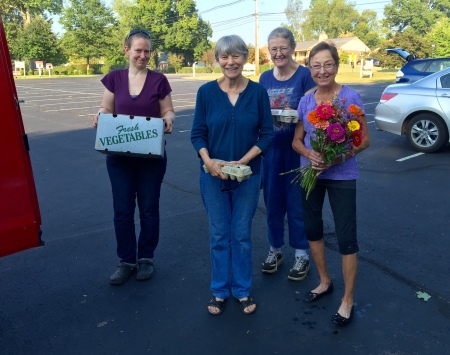
As I hear of Hurricane Matthew battering hapless Haiti, I am reminded of the fragility of this farming enterprise, let alone of life itself. Some have suffered and some are suffering through catastrophe, but our fate has furnished us—this year at least—with the opposite end of fortune. And we shouldn’t be fooled that we are fairly spared, but rather our hearts, buoyed by present-tense and fast-passing placidness, should hurt even stronger for those who have been laid low, as we will be.
Every year every box is unique
Raising hundreds of varieties of vegetables—planted across four seasons of erratic weather, discombobulated by mercurial meteorologists, distracted by stubborn demands like eating and sleeping and family and friends—means not achieving perfection. Sometimes we hit the elusive jackpot and almost end up cursing the plenty (of eggplant). Some things can succeed just as we envisioned them, striking the perfect harmony of abundant-leaning moderation. Sometimes circumstances conspire against our intentions, and we for a time live leanly.
However much we learn from our failures, there are always plenty of new ways to fail waiting to teach us more we need to learn. Take these two 2016 snippets:
*For several years now I have planted two varieties of turnip seeds together, Hakurei and Purple Top White Globe. The Hakurei grows faster and gets picked first. This spring, however, the Purple Top didn’t seem to be sizing up at all. I was mystified, but by then the rising tide of summer swelter swept me away from this minor confusion. Then this fall it slowly dawned on me that the same thing was happening again. I became sure these weren’t really even turnips and decided to channel my ire and boycott the shameful seed company for false advertising. Finally, having taken quite too long, I realized my mistake: in the early spring, no doubt fueled by hurry and carelessness, rather than mixing Hakurei and Purple Top White Globe turnip, I had mixed Hakurei and American Purple Top rutabaga seed. So, no Purple Top turnip this year, but the Purple Top rutabagas are looking marvelous.
*We stayed nearly too wet all the way through July. Thus I wasn’t surprised in early August when the meteorologists began to hyperventilate about a great rain event—5 to 6 or possibly many more inches over the weekend. I picked things early and more aggressively than normal. I planted one night by headlamp. By week’s end, all our fall brassicas (broccoli, cabbage, kale, etc.) were in the ground. As prepared outside as possible, I brought a couple hundred pounds of tomatoes into the house and got busy canning. It got stranger and stranger to me as the sun kept shining, the heat kept baking. I imagined my tender broccoli plants wilting, begging for help. I sweated over the stove, the fire of the sun crackling outside. By the time the rain arrived, I had 20 quarts of sauce, 40 pints of salsa, and a lot of dead baby plants. We’re now nonetheless enjoying a successful fall brassica campaign, but an important lesson resounds: a vegetable farmer without irrigation is a gambler, destined to periodic, meteorologist-induced sweats.
Time piles up
Either time is passing faster or I am moving slower, or both. It has—once again—been multiple months since the last farm newsletter, which was itself short on agricultural observations. I admit I have been stymied by a futile struggle with time. My babies have turned to young boys.
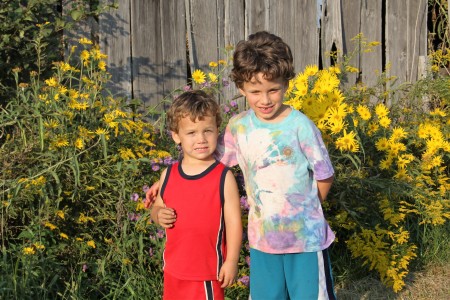 The gears keep turning. I look ahead and see “his big manly voice/turning again toward childish treble” and look down and see my “schoolboy with his satchel/and shining morning face, creeping like snail/unwillingly to school.” I feel I could just linger here, in this precious present, “But at my back I always hear/Time’s winged chariot hurrying near.”
The gears keep turning. I look ahead and see “his big manly voice/turning again toward childish treble” and look down and see my “schoolboy with his satchel/and shining morning face, creeping like snail/unwillingly to school.” I feel I could just linger here, in this precious present, “But at my back I always hear/Time’s winged chariot hurrying near.”
All this borrowed poetry to say life here is painfully beautiful and achingly cherished. Thanks for making it this way.